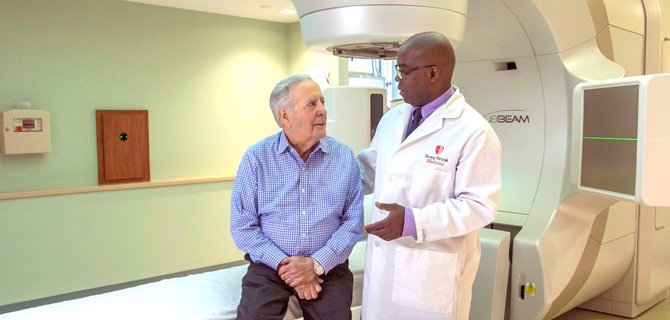Approximately two weeks after your first treatment you may begin to experience side effects, or symptoms caused by radiation therapy. These symptoms may continue throughout the treatment period, and gradually disappear during or after you have completed treatment. Your doctor will tell you which symptoms you are likely to experience, when you will notice them and how long you will experience them. It is important to follow the appropriate instructions to minimize your discomfort.
SKIN REACTIONS
You may develop skin reactions while receiving radiation treatments. These reactions occur because x-rays must pass through the skin to reach the location of the tumor. Special care of the skin in the treatment area is important to help prevent or minimize skin reactions. See the teaching sheet on skin care.
FATIGUE
During radiation therapy, the body uses a lot of energy. Stress related to your illness, daily trips for treatment, and the effects of radiation on normal cells all contribute to fatigue. The amount of fatigue varies with each person and generally will go away when your treatment is completed. We recommend that you pace your activities and plan for frequent rest periods to avoid becoming overtired.
If you have some one available to help you clean the house, shop or cook meals, take advantage of their help while you feel fatigued. If you live alone and are too tired to cook a full meal, try some of well-balanced frozen dinners.
CHANGES IN BLOOD COUNTS
Bloods counts will be monitored weekly or more often if large areas of bone marrow are in the treatment field. The radiation affects the body's ability to reproduce white blood cells and platelets (which are made in the bone marrow) at a normal rate. Therefore, a treatment break may be needed to prevent the possibility of infection and bleeding if these counts get too low. If you are receiving both chemotherapy and radiation therapy, you may have to have your counts checked more often. You doctor or nurse will let you know if you counts are changing and what to do if this happens.
DIFFICULTY SWALLOWING
- You may notice a feeling of burning or fullness or have the sensation of a lump in your throat when you swallow. This side effect is more likely to occur after two or three weeks of treatment. To help with swallowing, we suggest:
- Foods which are soft, smooth, and moist are easier to swallow. Cool or room temperature foods are more comfortable to swallow. Adding liquids such as gravies and sauces may make foods easier to swallow.
- Avoid dry or coarse foods such as crackers, nuts, potato chips, pretzels, raw fruits, and vegetables, Avoid highly seasoned foods, and acidic foods such as oranges, tomatoes, etc. Avoid alcoholic beverages and tobacco, as they will irritate your throat and esophagus.
- Try eating smaller amount of food more often. Some people find that four to six small meals are better than three large meals a day.
- Eat a nourishing soft diet. Include foods from all four food groups. It is important that you try note to lose weight during radiation therapy.
- Liquid antacids before meals may be helpful to coat your throat and esophagus. It may help to soothe your throat and ease any "burning" sensation.
- There are medicines which can help you to swallow, just ask your nurse or doctor.
DRY or SORE THROAT
This side effect is most likely to occur after two or three weeks of treatment. We suggest the following to help:
- Drink plenty of liquids, at least eight to ten glasses of fluids per day.
- Try sucking on hard candies or mints, or chewing gum to increase moisture in the mouth. Choose sugarless gums and candies.
- Consider using a cool-mist vaporizer while you sleep and in the main living area to increase the moisture in the air.
- You may try chewing Aspergum to decrease localized soreness or inflammation unless there is a medical reason that you may not take Aspirin.
- Mix ¼ teaspoon of salt and ¼ teaspoon of baking soda in eight ounces of warm. Gargle with this solution several times a day. Do not use the over-the-counter mouthwashes or lozenges.
- Do not smoke cigarettes, cigars, or a pipe. Do not chew tobacco.
COUGH
Your nurse and doctor will advise you on the use of cough medicine. If you have a lot of mucous, make sure you are drinking enough fluids to keep the mucous thin so that you may cough this up more easily.
Feel free to direct any questions and/or concerns you may have related to your treatment to your primary nurse and physician. The phone number is (631) 444-2328, Monday-Friday, 8 am to 6 pm. Evenings, weekends, and holidays, please call (516) 783-1610


